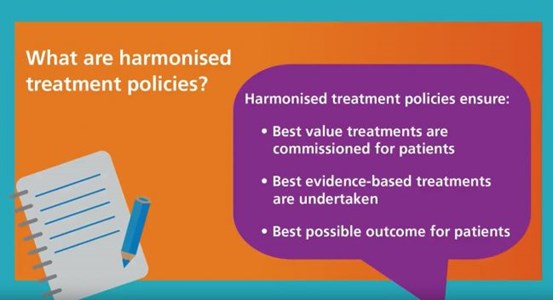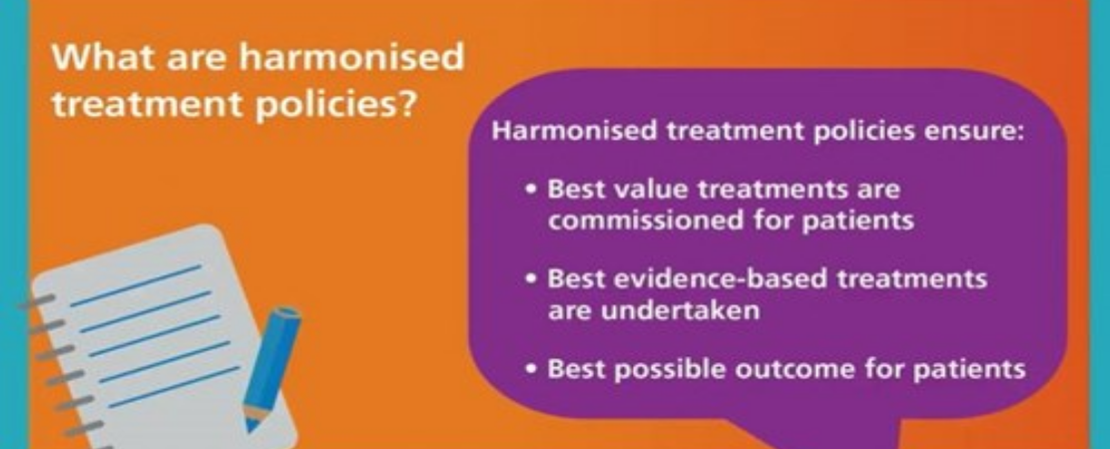NHS Birmingham and Solihull Clinical Commissioning Group (CCG) and NHS Sandwell and West Birmingham CCG needed to undertake development of a number of treatment policies to complete the second phase of their review for procedures with limited clinical effectiveness or restricted access criteria.
Arden & GEM managed and delivered an 18 month project to develop 22 harmonised policies, ready for implementation in January 2019, which have been informed by the most up to date evidence, best practice, clinical opinion and patient experience. This will ensure the best clinical outcomes are achieved for patients and local healthcare resources are utilised in the most efficient way.

The challenge
The NHS has finite resources and needs to make decisions which ensure that treatment policies:
- are evidence-based
- achieve the best possible clinical outcomes for patients
- provide best value.
To ensure this happens continually and consistently, NHS Birmingham and Solihull CCG and NHS Sandwell and West Birmingham CCG needed to complete a thorough review of treatment policies for procedures with limited clinical effectiveness or restricted access criteria. Harmonised treatment policies needed to reflect the most up to date clinical evidence; be consistent across Birmingham, Sandwell and Solihull; and provide clarity for patients, and primary and secondary care providers.
Our approach
In July 2017, the project began to harmonise treatment policies for 27 conditions on behalf of the two CCGs. Arden & GEM was tasked with:
- Preparing evidence reviews and drafting new policies
- Undertaking clinical and public engagement
- Completing Equality Impact Assessments
- Providing project management support.
Policies covered a range of health areas such as musculoskeletal treatments, assisted conception, breast implant revision surgery, assisted cough machines, acupuncture, port wine stain, ear wax and snoring.
Bringing stakeholders together
Our first step was to bring together clinicians and key stakeholders in a forum to consider and discuss evidence reviews and assess new policies. The Treatment Policies Clinical Development Group (TPCDG) was reconvened with representatives from commissioners, providers, public health, general practice, and also including relevant subject matter experts as needed, for example, orthopaedic and dermatology consultants and GPs with special interests.
Preparing evidence reviews and policies
Our team sourced national clinical evidence from NICE and a number of Royal Colleges to prepare thorough and balanced evidence reviews. For the more complex – and potentially contentious – reviews, we were able to draw upon expertise from our NHS consultancy, Solutions for Public Health; a multidisciplinary team of public health, clinical, research and analytical experts.
The reviews were presented to the TPCDG by our lead clinical nurse in a phased manner. Feedback from the TPCDG informed our production of the draft policies, which were also subject to comment and review by the group. This process took place over a seven month period. During this time the group identified that five specific policies should be deferred pending further investigation, updated NICE guidance and/or revisions to the service specification.
For each policy, our experienced equality and diversity team also completed an Equality Impact Assessment, covering all strands of diversity, to ensure that changes didn’t discriminate against patients based on a protected characteristic.
Engaging with the public and clinicians
Following TPCDG approval of the 22 harmonised policies, the CSU’s engagement, communications and marketing team organised a series of patient engagement activities including a short online survey, posters and briefings for GPs, a dedicated website area, a project information video, and a series of targeted outreach events.
Fifteen targeted outreach events were organised across the area, using venues such as leisure centres, community centres and play centres to directly reach people in the community in different ways. This part of the engagement resulted in over 100 conversations with 103 questionnaires completed. An additional 86 questionnaire responses were also obtained online.
Over 500 stakeholder organisations, 250 GP practices and 200 specialist clinicians were also approached for feedback on both the evidence reviews and draft policies.
The clinical feedback and public feedback were brought together into a full report for the TPCDG. This resulted in changes to some of the draft treatment policies, which were reflected in a specific ‘You said, we did’ engagement report. One significant change in draft policy was for the use of cough assist machines.
While the evidence base was inconclusive regarding effectiveness, expert clinical opinion and patient experience argued for the equipment’s usefulness and justification in commissioning. The CCGs agreed to a change in proposed policy and two specialised centres will, from January 2019, be able to approve and supply the machines where appropriate.
Ongoing governance and communication
Given the complex and wide-ranging nature of the treatment policies being harmonised, it was essential that constant communication took place with the CCGs to ensure that any potential changes in commissioning policy could be integrated into business as usual. This required regular updates and presentations to various boards and sub-committees.
Following recommendation from the TPCDG, the 22 revised treatment policies have been presented to and approved by the relevant quality and safety committees and Governing Boards, with final ratification provided by the local Health Overview and Scrutiny Committees.
"Policy development is one of the most challenging areas of commissioning which the team handled with rigour, fairness and collaboration, resulting in an excellent piece of work."
Rachel O'Connor, Director of Planning and Performance at Birmingham and Solihull CCG
The outcomes
As a result of this project’s rigorous approach to project management, stakeholder engagement and clinical evidence, the two CCGs covering Birmingham, Sandwell and Solihull now have 22 harmonised treatment policies, ready for implementation in January 2019.
The policies have been informed by the most up to date evidence, best practice, clinical opinion and patient experience. They will bring about clear and transparent changes in commissioning which will contribute over £1m towards QIPP plan savings.
"Arden & GEM managed a very complex, high profile project, which had significant public and professional stakeholder interest, within agreed project timescales delivering excellent project outcomes."
Neil Walker, Associate Director – Right Care and Planned Care at Birmingham and Solihull CCG
